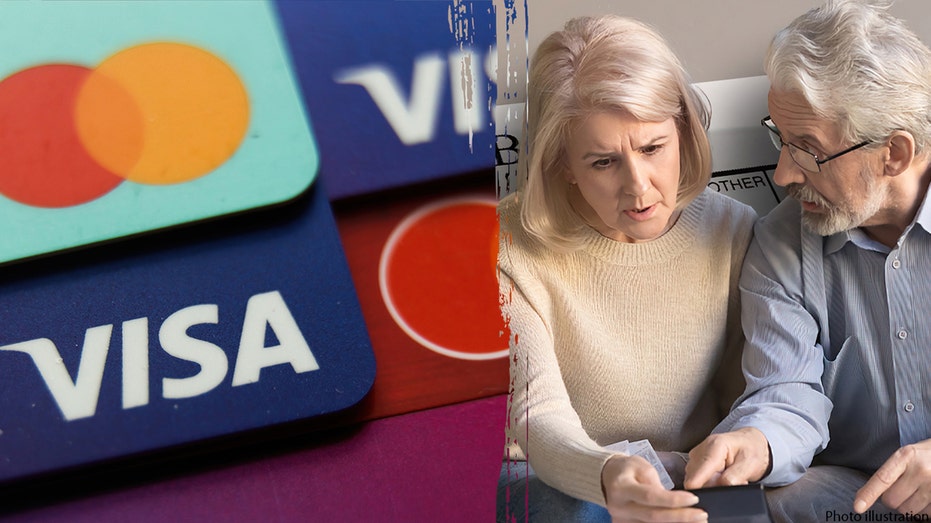‘Mornings with Maria’ panelists Kyle Wool and Mark Tepper discuss Warner Bros. Discovery reporting a double miss on earnings and revenue and the latest jobs data.
Credit cards can serve as a powerful tool, but they also present risks to achieving your financial freedom.
That’s what a new Bankrate survey unpacks as the Federal Reserve Bank of New York released its Q2 report on household debt and credit, showing that credit card debt is growing.
“When you rob Peter to pay Paul, you eventually run out of Peters to rob. And we are getting to that point right now,” Strategic Wealth Partners CEO Mark Tepper told Fox News Digital in reaction to the report.
“It’s important to prioritize credit card debt payoff because this is probably your highest-cost debt by a wide margin,” Bankrate senior analyst Ted Rossman said in the survey.
AMERICANS OWE A RECORD $1.14T IN CREDIT CARD DEBT AS INFLATION SQUEEZES
At least 50% of Americans are carrying a higher balance today, on a month-to-month basis, than they were in March 2020. This is up from just the 44% recorded this past January.

Strategic Wealth Partners CEO Mark Tepper tells Fox News Digital that artificial stimulus created an “addiction to consumption.” (Fox News)
“Credit card balances fell sharply in 2020 as many Americans spent less during the pandemic and used stimulus funds to pay down debt,” Rossman explained. “Since the beginning of 2021, however, credit card balances have been off to the races. According to Federal Reserve data, Americans owe 45% more now on their credit cards than they did in early 2021. And the credit card delinquency rate is at its highest point since 2011.”
Tepper, whose firm oversees more than $4 billion in assets, is generally anti-credit card. He argued the rising debt is a “huge issue” for consumers, and has become difficult to chisel away due to high interest rates. He previously warned of a “consumer credit crisis” on “Mornings with Maria” Thursday.
FOX Business’ Gerri Willis reports on the alleged ‘out-of-control’ costs associated with going back to school and how much families may expect to spend this year.
“The real issue to me from a behavioral standpoint is that in 2021, consumers no longer needed fiscal stimulus checks hitting their mailboxes. The economy was already reopened, people were back at work even if they were working remotely, and we were not in a recession. And the fact that a family of four received over $10,000 in stimulus checks when it was unnecessary, that causes an addiction to consumption,” he further explained.
Respondents noted inflation and high interest rates as main factors for debt in the survey, and, in addition, it found your likelihood of having credit card debt increases with age until the boomer generation.
BUDGET WATCHDOG BITES AT HARRIS’ ‘BLANK SLATE’ POLICY PLATFORM: THIS IS A ‘REALLY DIRE’ SITUATION
But Tepper pointed out how “phantom” debt, accumulated by the buy now, pay later apps like Afterpay, Klarna and Affirm, is a hidden hit to consumers’ wallets and the macroeconomy.
“The issue with buy now, pay later debt, it’s estimated right now to be $700 billion,” which the CEO noted is not reported by credit bureaus.
Ramsey Solutions personality Jade Warshaw on younger generations living with their parents, ‘buy now pay later’ risks and how to best diversify stock allocation.
“People want to finance their groceries now, because I think it’s 30 or 40% of buy now, pay later that’s being used in grocery stores. So this is for essentials, this isn’t for an Apple iPhone. This is for bread and potatoes,” he expanded.
Another eye-popping number in this survey, according to Tepper, is that when separating debtors by income, 62% of households that make less than $50,000 annually have carried debt for more than a year – the same percentage for those making more than $100,000.
“I think the middle American consumer is going to be hurt the most,” he said. “Higher income consumers, they might be able to weather the storm a little bit, but even one-third of higher income individuals are still worried about how they’re going to make ends meet.”
GET FOX BUSINESS ON THE GO BY CLICKING HERE
Strategic Wealth Partners’ Mark Tepper argues that March’s hot inflation report will impact stock valuations and market trades.
While economists have remained mixed about declaring a technical recession, Tepper noted that low and middle-earning individuals and families are facing a fiscal downturn.
“I’m in agreement that lower income consumers and middle America are probably in a recession right now,” he said. “The consumers continue to trade down, and that’s something you don’t do when times are strong. That’s something you do when the economy’s weakening and when you are beginning to feel the pinch in your wallet.”
READ MORE FROM FOX BUSINESS
